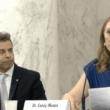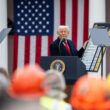Trump’s undoing of American influence
May 8, 2018
President Donald Trump finally pulled the plug on US participation in the Iran nuclear deal in a statement at the White House. Facing a requirement to continue to waive sanctions under a 2012 defense authorization law by May 12, Trump decided to keep his campaign pledge to abandon the Iran deal. Undoubtedly, his two newest advisors—National Security Advisor John Bolton and Secretary of State Mike Pompeo—bolstered his confidence to take this dramatic step.
For Trump, getting out of the Iran deal is the political equivalent of firing someone on “The Apprentice.” It is a short-term action completely divorced from any consideration of long-term consequences. In this case, however, the long-term consequence may not be what he fears, which is a resurgence of Iranian bad behavior, including development of nuclear weapons. Instead, it will be a far greater negative development for global security—the growing and ultimate irrelevance of the United States.
Despite Trump’s visceral dislike of the Iran deal—known officially as the Joint Comprehensive Plan of Action, or JCPOA—it had benefits for all.
Already, press reports indicate that Iran will work with European countries, and Russia and China, to continue to implement the accord. This is the surest way to diminish US authority and leverage. Russia and China have little use for American efforts to rewrite the rules of the game, and Europeans, while they traditionally side with the US, may at this point be a little skeptical of Trump’s vision. Macron, reportedly, has been consulting with Iranian officials just this week.
Ironically, the very commodity that brought Iran to the negotiating table—oil—will be the undoing of American influence. The set of sanctions that Trump will first reimpose means big costs for big oil companies. Those sanctions affect third parties that do oil business through the Central Bank of Iran and have US banking business. Between 2012 and 2015, oil purchases from Iran fell, but then rose again to pre-sanctions levels after the Iran nuclear deal took effect. In 2016, Asian buyers (China, India, South Korea, and Japan) bought 85 percent of Iran’s oil exports, and European buyers purchased the rest. India is poised to significantly increase its oil business with Iran. What will these US allies and competitors (including China) do now?
Iran has huge incentives to stay in the deal. After all, oil accounts for more than half of all of its exports. The Europeans, Russia, and China will also have their own incentives to continue implementing the JCPOA. China, Japan, and South Korea rely on Iran for between six percent and 10 percent of their oil imports. The question is whether they can find an unobtrusive work-around US third-party sanctions on Iranian oil. Using oil trading firms like the Swiss-headquartered Vitol might be an option.
For his part, President Trump offers little that would replace the JCPOA. He has been stark in his criticism of the Iran nuclear deal but his prescriptions of how to fix its “terrible flaws” are essentially unworkable. For example, his proposal in his January 12, 2018 speech that the deal be changed to require Iran to “allow immediate inspections at all sites requested by international inspectors” is impractical and demonstrates ignorance about the basic operations of inspections.
Similarly, it’s unclear how he would ensure that Iran “never even comes close to possessing a nuclear weapon.” For verification experts, possession of a nuclear weapon is the very tail end of a long developmental process, and most experts would prefer that the line be drawn much earlier on—say, for example, at Iran’s ability to produce material for use in a nuclear weapon. Likewise, Trump’s requirement that a new deal eliminate the “expiration date for the JCPOA’s nuclear restrictions on Iran” is unrealistic and seems to presume that Iran will forever be a pariah state.
The purpose of the JCPOA was not to perpetually punish Iran but to start a process of building transparency and, hopefully, trust on all sides that would lead Iran to conclude it was better off without nuclear weapons than with them. President Trump’s other requirements—subjecting Iran’s development and testing of missiles to “severe sanctions,” and having the United States and its allies take stronger steps to “confront Iran’s other malign activities”—have already been acted upon and do not require any changes to the JCPOA.
If Iran and other JCPOA partners find a way to continue implementing the deal, President Trump may ultimately be ushering in the denouement of US influence in the nuclear nonproliferation realm, and perhaps beyond.
Sharon Squassoni
research professor at the Institute for International Science and Technology Policy
EXPERT COMMENTARY
Elliott School of International Affairs, the George Washington University; Bulletin Science and Security Board member













